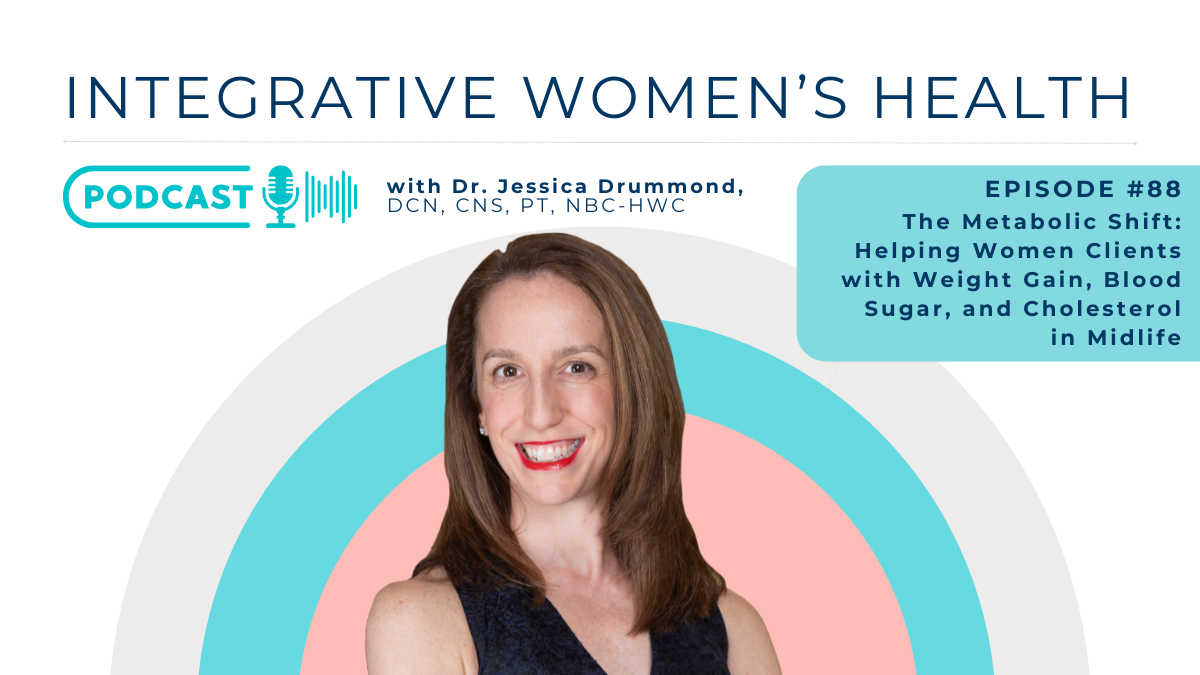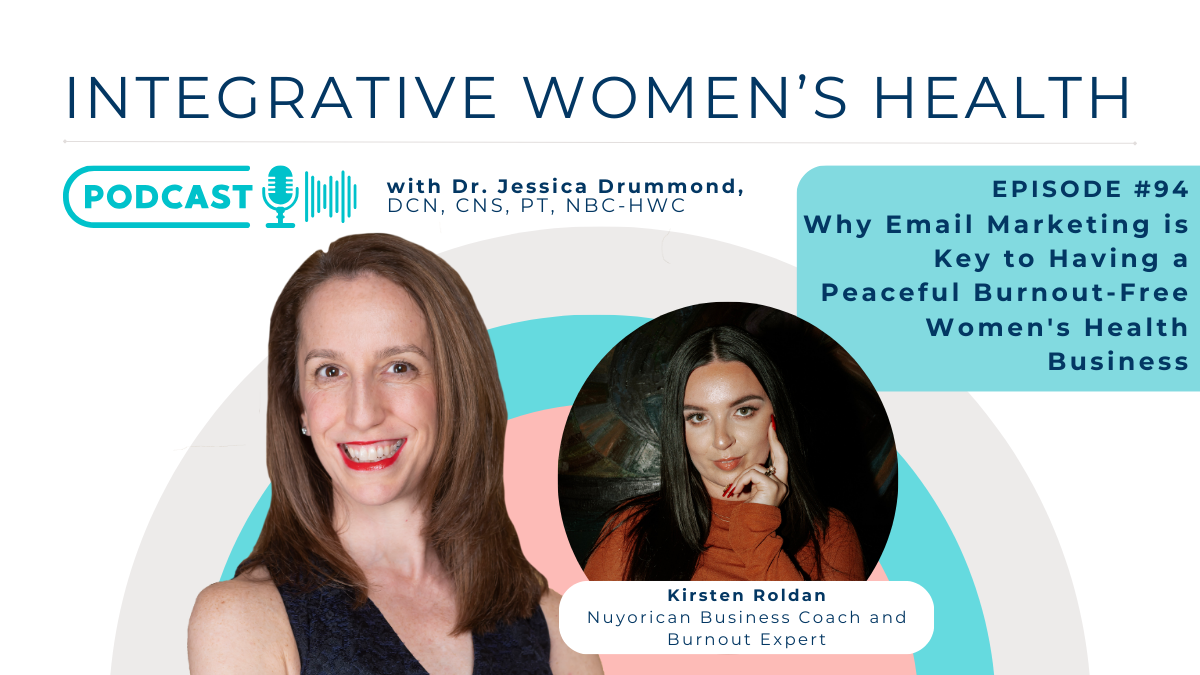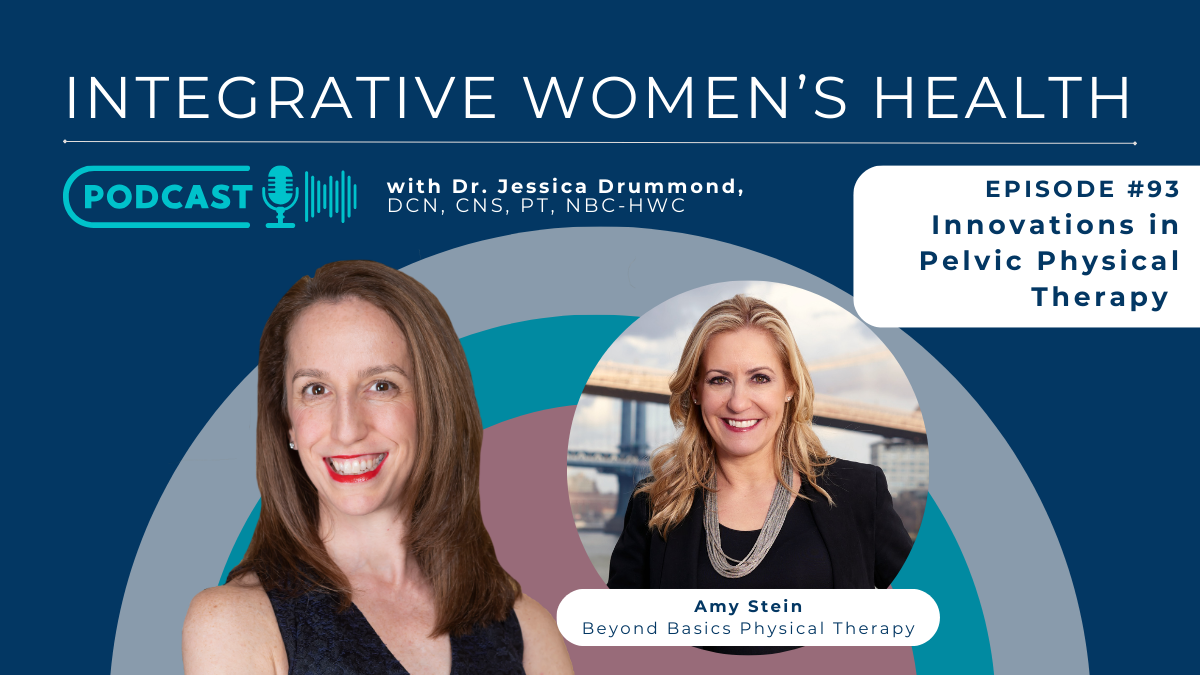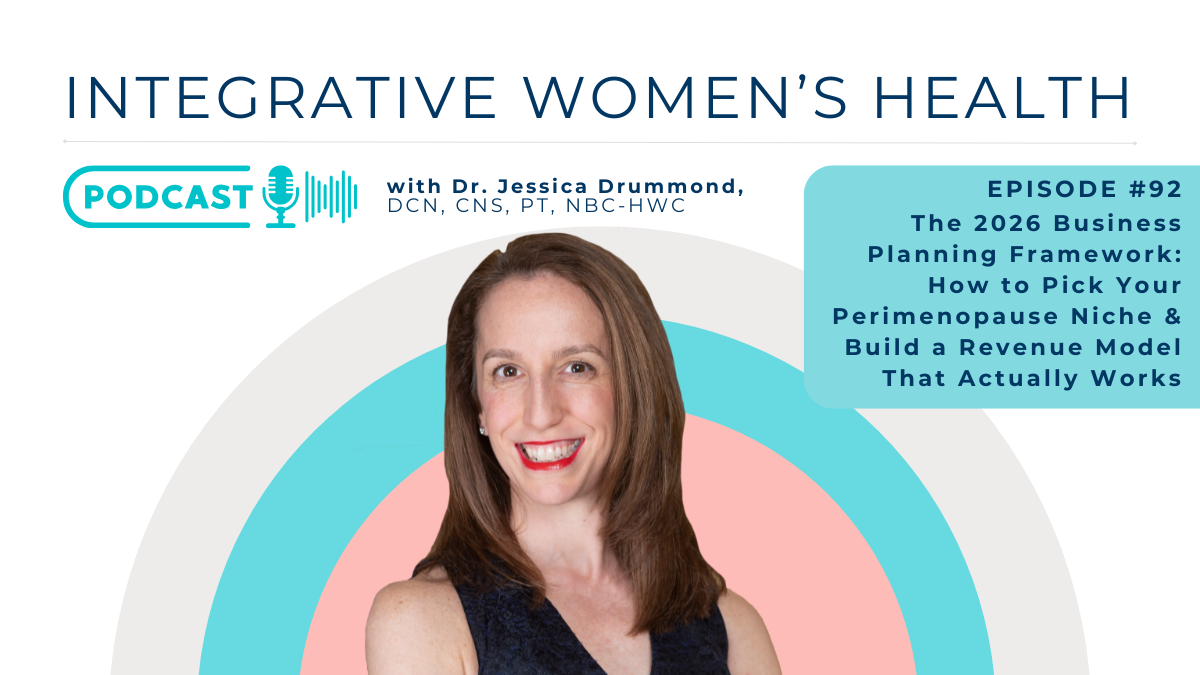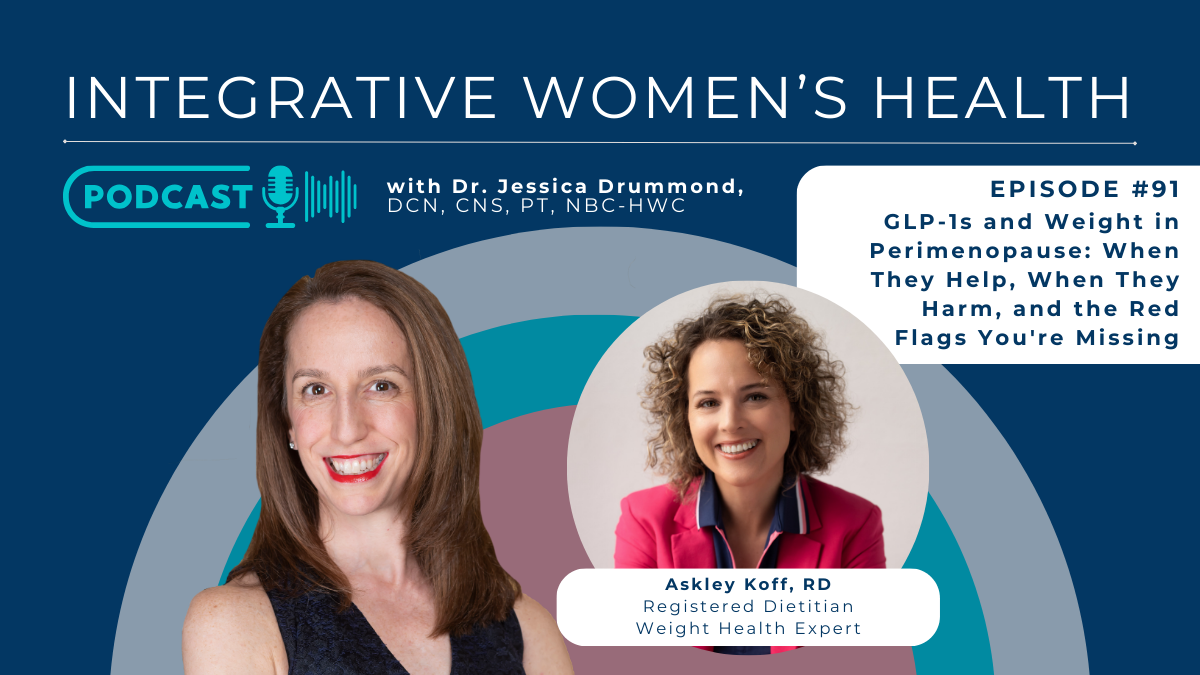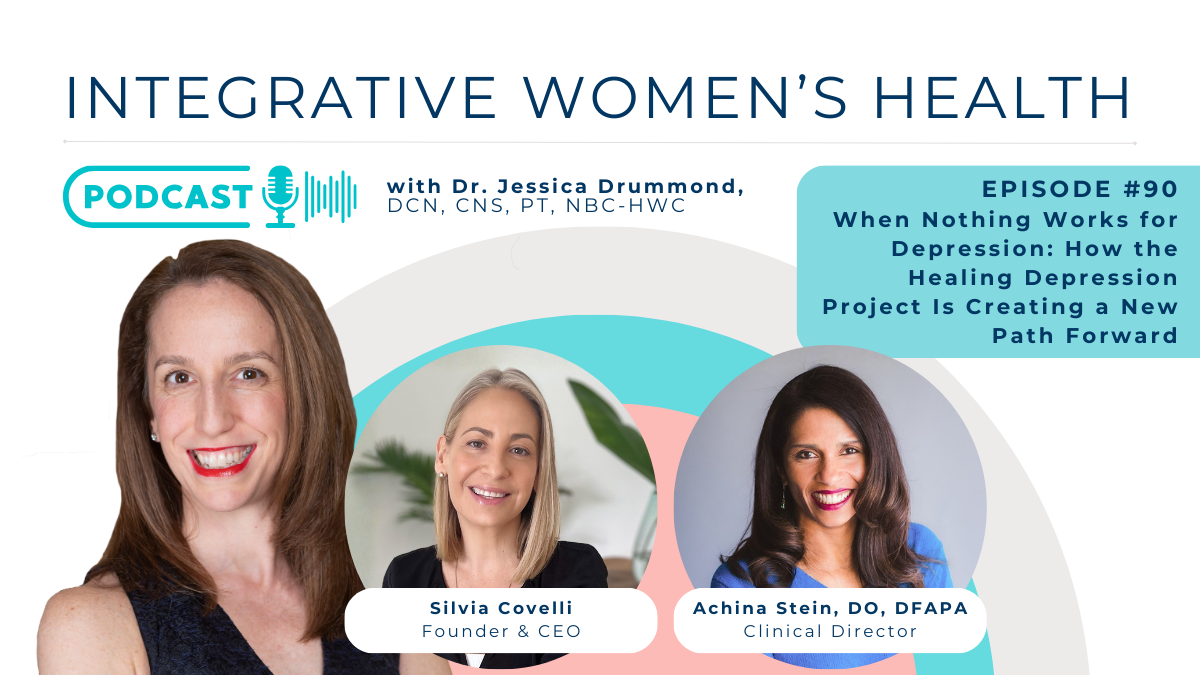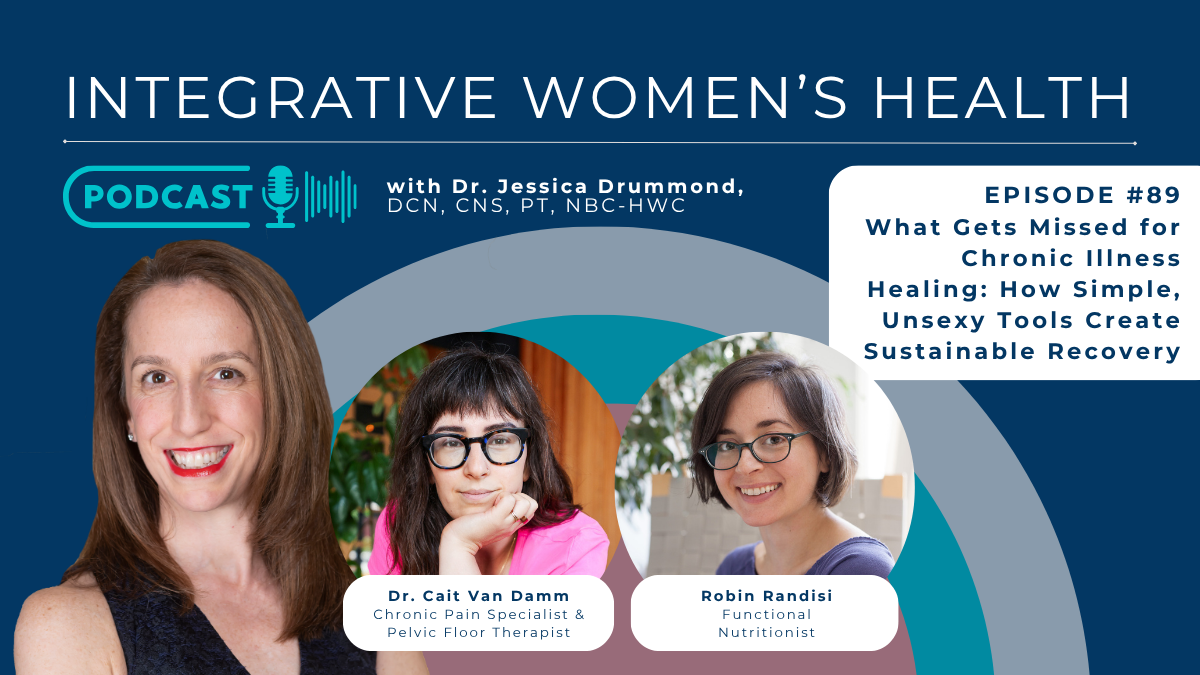Follow Us for Free:
About the episode
“When your client says their body changed overnight, she’s not exaggerating.” – Dr. Jessica Drummond
So many women arrive in perimenopause or menopause feeling blindsided by the changes in their bodies. They’re exercising, eating well, and they might even be using hormone replacement therapy (HRT), but no matter what they do, they’re noticing weight gain around the middle, higher cholesterol, or shifts in their blood sugar. It can be discouraging for both the client and for us as practitioners when all the usual tools stop working. But these changes are not about willpower or doubling down. They’re about physiology.
During the menopause transition, the body goes through a true metabolic shift. Even women who seem to be perfectly healthy can experience significant changes in body composition, energy, and cardiovascular health. Research shows that each year of the menopause transition brings about a 1.7% increase in visceral fat and that LDL cholesterol can rise by up to 12%. Understanding how and why these physiological changes happen is the key to better supporting our midlife clients with compassion, structure, and confidence.
Today, I’m breaking down everything about metabolism in midlife. I’m sharing the key findings from the SWAN study, how hormones, insulin resistance, and SHBG work together to influence weight, blood sugar, and energy, practical strategies for assessing and supporting clients through these changes, integrating the Confidence in Complexity framework for long-term results, and more.
Enjoy the episode, and let’s innovate and integrate together!
Highlights
- Why the menopause transition creates unique metabolic challenges for women
- Common frustrations during midlife, like unexplained weight gain, cholesterol rise, and glucose changes
- SWAN study findings about the metabolic shifts during midlife
- The role of testosterone, SHBG, and insulin resistance in midlife metabolism
- The growing gap in clinical expertise and training for complex perimenopausal cases
- Why practitioners need to assess interconnected systems, not individual symptoms
- The IWHI Perimenopause and Menopause Certificate Program and its frameworks
- How the program equips practitioners with protocols, labs, and client communication tools
- The rising market demand and career opportunities for trained menopause experts
Mentioned in this episode
Free Resources
FREE Training | How To Build A Flexible and Fulfilling Perimenopause and Menopause Career
FREE Workshop | How to Build a Thriving Perimenopause and Menopause Health Coaching Practice
Ready to revolutionize your career and grow your practice?
- The Integrative Women’s Health Membership
- What is the next step in your career in women’s health and wellness? Start here: https://integrativewomenshealthinstitute.com/start-here/
- Integrative Women’s Health Institute on Instagram | @integrativewomenshealth
- Integrative Women’s Health Institute on YouTube
Learn more about The Integrative Women’s Health Institute’s Programs.
Click here for a full transcript of the episode.
Dr. Jessica Drummond 00:00:03 Hi and welcome to the Integrative Women’s Health Podcast. I’m your host, Doctor Jessica Drummond, and I am so thrilled to have you here. As we dive into today’s episode, as always innovating and integrating in the world of women’s health. And just as a reminder, the content in this podcast episode is no substitute for medical advice, diagnosis, or treatment from your medical or licensed health care team. While myself and many of my guests are licensed healthcare professionals, we are not your licensed healthcare professionals, so you want to get advice on your unique circumstances. Diagnostic recommendations treatment recommendations from your home medical team. Enjoy the episode. Let’s innovate and integrate together. Hi there. Welcome back to the Integrative Women’s Health Podcast. I’m your host, doctor Jessica Drummond. If you’ve not watched last week’s episode yet or listened, I’m a listener myself. I like to listen and walk with my podcast. Absolutely. Go back and do that. Today we’re going to talk about the metabolic shift of perimenopause and menopause. So similar to the neuroendocrine neuro immune shifts of perimenopause.
Dr. Jessica Drummond 00:01:27 This is not just about aging. This is about shifts that are happening in perimenopause. Before we dive in today, I want you to think about a conversation you’ve probably had with one of your clients or patients or yourself or your friends. Maybe it was Tuesday afternoon, your 3 p.m. client, let’s call her Erica. She sat across from you, clearly frustrated. She’s 51. She told you I’m exercising. I’m eating. Well, I’m even on HRT now. I’m not doing anything different. In fact, I’m adding better things and I’m still gaining weight around the middle. And I just did my blood work at my annual physical. My cholesterol jumped 40 points in six months. What am I doing wrong? Or maybe it was the client before her. The one who said I thought hormone therapy would fix this. Isn’t that the prevailing wisdom on Instagram? Right? Why is my fasting glucose creeping up when I’m doing everything right? I’m eating the healthy diet. I’m exercising. Here’s what I know. You didn’t have a great answer for Erica, because the reality is we’ve been taught eating healthy exercise consistently at HRT, and that’s the solution.
Dr. Jessica Drummond 00:02:43 But most of us, we’re not trained on what’s actually happening metabolically during the perimenopause to menopause transition. So today we’re going to break down the landmark research, which I’m actually saw even just today, a study that confirms everything we were talking about here that’s been seen in the Swann study that Erica is experiencing. More importantly, we’re going to be talking about the clinical expertise gap that exists in perimenopause and menopause care right now, and why that gap represents the biggest professional opportunity that you’ll likely see in your career. There is a huge dearth of support here. Here’s the truth there are literally tens of millions of Erica’s out there, and most practitioners simply don’t know how to help them, especially at a very strategic level when they also have other complicating issues. Endometriosis pots, history of concussion, chronic post viral syndrome. Right? You need to understand all of that in the context of this perimenopausal shift. All right. So let’s start with this one study. The study of women’s health across the nation has been tracking for over 14 years, with more than 1200 women, a variety of ethnicities.
Dr. Jessica Drummond 00:04:12 So when Erika told you I’m gaining belly fat, despite doing everything I’ve been doing before and kept me healthy, eating healthy, exercising consistently. The Swan study found that visceral fat, the metabolically dangerous fat that wraps around organs, increases by 22%. And this is a population. Of course, it’s not necessarily that in each individual woman in perimenopause that the risk is there, that from the beginning of perimenopause in the late 30s to early 40s, to post menopause in the early 50s, visceral fat increases 22%. And this can feel like it happens Overnight, even if the BMI stays in the normal range and a woman doesn’t actually gain physiologic weight, this is a body composition. Each year of the menopause transition brings about a 1.7% increase in visceral fat. The sharpest acceleration is that 1 to 2 years before the final menstrual period. So when Erica says it feels like my body changed overnight, she’s actually not exaggerating. Her body composition did change dramatically in a very narrow window of time. Despite what she’s been doing now, let’s talk about that cholesterol jump that scares so many of our clients and patients.
Dr. Jessica Drummond 00:05:41 The Swan study revealed something that should have changed clinical practice everywhere, but we all know there’s that 17 to 20 year delay between research and clinical shifts. Total cholesterol can jump by 10% and LDL cholesterol by 11 to 12% in just one year around the menopause transition, regardless of age, regardless of BMI, regardless of lifestyle. Listen to that again, regardless of lifestyle. So these are our women who are doing all the right things from a health perspective. Erica is exercising, she’s eating well and her cholesterol still spiked and it didn’t before. So this is not about patient client compliance. This is about perimenopause and menopause physiology. Now obviously again this is a population level finding. So the exact percentage of shift may be at some to some extent influenced by lifestyle. But this is a common experience by all women in that perimenopause to menopause transition. And what about that creeping up fasting glucose? The Swan study data found that the risk of developing metabolic syndrome jumps 5% with each year of perimenopause and 24% per year. After the final menstrual period by menopause, nearly.
Dr. Jessica Drummond 00:07:07 So remember, menopause is like. Exactly one year from the date of the last menstrual cycle. 1 in 7 women will develop new onset metabolic syndrome. And don’t forget the number one killer of women. It is heart disease. That’s one in every seven of your clients, and probably more because these are people that are seeking your health, because they’re noticing that visceral fat shift or their change in their body composition, a sluggishness or fatigue. Now here’s where it gets a little more interesting, where the clinical expertise gap lives. Most practitioners think this is all about low estrogen. And yes, the estrogen decline does play a central role in visceral and central adiposity, lipid changes, and insulin resistance. We do need to be thinking about estrogen. It’s very interconnected with insulin resistance. But here’s what the Swan study found that most practitioners miss women with higher bioavailable testosterone or lower sex hormone binding globulin. SHBG are at the highest risk for metabolic syndrome and dyslipidemia. So it’s not just about low estrogen. It’s also about the androgen shift.
Dr. Jessica Drummond 00:08:23 But think about what that androgen shifts means metabolically, that’s all often a sign of insulin resistance, just like we see in PCOS, right? So how many practitioners are testing SHBG levels in their patients and clients? How many understand those clinical implications of the testosterone to SHBG ratio during this transition? Very few. And hey, what’s one of the number one things that increases beneficially SHBG. Lots and lots of fiber. And that’s the gap. The research tells us what is happening, but it doesn’t tell us how to intervene clinically. When you’re sitting across from Erica and she’s asking like, what do I do about this? I’ve been eating like this for 20 years and felt just fine. The Swann studies didn’t provide clinical protocols. They didn’t give you a framework for addressing the sleep deprivation that’s also driving her insulin up or the stress cortisol visceral fat cycle or had a sequence interventions. When your client presents with me CFS or Pots or a history of gestational diabetes or PCOS and she’s in the perimenopause to menopause consistent. That’s what’s missing.
Dr. Jessica Drummond 00:09:44 Erica needs more than a mediterranean diet handout and a suggestion to walk more, right? So sometimes people get a little info, but that’s simply not enough. She needs a practitioner who understands the interconnected physiology of perimenopause, who can assess and track the right markers. Address both metabolic and hormonal drivers and create a strategic clinical plan. And right now, most practitioners can’t do that. Not because they’re not smart or capable, or maybe not even because they don’t know this data, but simply they haven’t been trained to look at all of the interconnected things that contribute to this. All of it. Sleep, neuroinflammation, gut microbiome health, hormonal transitions, the impact of SHBG on testosterone and insulin resistance. You have to understand all of it. That’s why we created the Perimenopause and Menopause Certificate program. Confidence in complexity. And I really mean complexity. These women are truly showing up with complexity. Complexity is exactly what you’re dealing with every day. Erica doesn’t have just one problem low estrogen, for example. That will be 100% solved with an estradiol patch, right? If it was, it would be very simple.
Dr. Jessica Drummond 00:11:14 That’s an Instagrammable recommendation. She has visceral fat accumulation, dyslipidemia, emerging insulin resistance, sleep disruption, and chronic stress. And we haven’t even started talking about her history. Prior to her 40s, we haven’t really talked about exactly what her stress is. These aren’t separate issues. They’re interconnected. So she may have a chronic viral infection or heavy metal toxicity. Others may have a marriage crisis or a work crisis. So in this program, we teach you to work with clinical frameworks that we call maps. Think of these as your mastery action plans. These are step by step protocols for the most complex presentations you’ll see in perimenopause, because they all are complex. Think about Erica. She’s you. She’s me. She’s all of our friends. She is every single one of your clients. So here’s an example. You’ll learn the metabolic syndrome and vascular risk map. This is the exact framework you’d start with with Erica. It walks you exactly through which lab data is important to consider beyond the standard lipid panel, including B, Homa, EIR, liver enzymes and inflammatory markers.
Dr. Jessica Drummond 00:12:40 And we’ll talk about how to do that depending on your scope of practice. We’ll also talk about how to assess waist to height ratio, body composition and tracking visceral fat changes. You’ll learn the specific nutrition Interventions, including fiber targets, protein distribution, and macro counting. Not really. We don’t love macro counting around here, but we will. We’ll talk about the details in the program. Omega three strategies and individualized carbohydrate approaches. Movement protocols that prioritize specific resistance training and post-meal activity because the research is clear on what actually moves the needle. But putting this all together can be really challenging, because what if she’s too tired, right? Sleep and stress regulation strategies are so key because over 40% of postmenopausal women report clinical insomnia, according to the Swann study. And then we’re also going to get into in the maps, get into when to consider hormone therapy, metformin, berberine, GLP ones or other adjunctive therapies, and how to monitor and adjust every 3 to 6 months or less, sometimes every 3 to 4 weeks.
Dr. Jessica Drummond 00:13:58 This isn’t generic wellness advice. This is clinically rigorous, evidence based protocol work. And we don’t just give you one map, we actually give you 14 different maps covering everything from cortisol, circadian and autonomic balance map to the estrogen flux and tissue sensitivity map to the migraine threshold and trigger map, and many more. Because your Perimenopausal clients don’t come in with one neat diagnosis as much as the health care system and the private equity pros that own them would love that. It’s just not reality. They come in with complexity, and the perimenopause and menopause Confidence and Complexity program gives you the clinical expertise to navigate that complexity with confidence. Confident. And because you have a framework to navigate through that is fully. Evidence based. Let’s talk a little bit about why this matters to your career and your work. Here’s what I want you to understand. This isn’t just about helping Erica, though. Honestly, that’s the most important thing. Patients are really not getting what they need from our current systems. This is also about your professional future.
Dr. Jessica Drummond 00:15:25 And we are knee deep in AI. Over here we understand what’s happening and what’s coming. Women aged 45 to 60 are the fastest growing demographic in healthcare, and a lot of them care about their weight and metabolic health. They have resources, they’re motivated, and they’re desperately looking for practitioners who actually understand what’s happening to their bodies and all the other things that they’re learning about. On Instagram, the GLP ones, the natural GLP ones, the berberine, the what kind of exercise? The protein macros. But most practitioners, including most functional medicine practitioners, nutritionists, health coaches and physicians don’t have specialized training in perimenopause and menopause. In fact, only 20% of physicians learn anything about menopause, and very few learn anything about perimenopause, when often things are more challenging. Clearly, what that means is massive professional opportunity in a current situation where it doesn’t feel like there’s a lot if you just feel trapped in this current system. Specialization equals differentiation. Differentiation plus clarity. True skill and confidence equals freedom. Freedom from insurance panels.
Dr. Jessica Drummond 00:16:51 Freedom from burnout. location. Freedom time, freedom, freedom from freedom to actually build the practice that you want that best serves our clients in this transition. But here’s the thing you can’t just call yourself a menopause expert because you took a weekend course or read a few articles. I mean, you could, but you you shouldn’t. Your clients are too smart for that right now. They’re learning a lot on their own. They’ll know within five minutes whether you actually understand the complexity of what they’re experiencing. The perimenopause and Menopause Confidence and Complexity program gives you legitimate expertise, the kind that builds trust instantly, because we also teach you really important communication skills, the kind that gets referrals, the kind that allows you to charge what you’re worth because you’re delivering the outcomes that other practitioners simply can’t. And it’s not just clinical training. We include business and career coaching. Not everyone wants to run a business. I get that and health coaching, communication skills. The secret sauce to your clients actually getting the results that they want.
Dr. Jessica Drummond 00:18:08 Because we know that clinical expertise without communication skills, without consistent implementation over time, and the business clarity that you need. So your nervous system is nice and calm. Without all that, you’ll just continue to struggle with frustration and burnout. Instead, we’re offering you a complete education in functional nutrition, health coaching, communication skills, perimenopause and menopause protocols at all levels that are built on structured frameworks. Chronic illness research that helps us integrate it right into this time frame. And you’re going to learn how to build a thriving career or practice. There’s literally nothing else like it on the market. And I can say that with complete confidence, because I have looked at every other program out there, including university level doctoral programs in nutrition. Honestly, do this. Instead, it’ll take you less time. Cost you a lot less money, and get you the same level of results that you need in your practice. So here’s my question for you. Are you ready? Are you ready to be the practitioner that Erica has been searching for? Are you ready to finally feel confident when a Perimenopausal client walks through your door with a constellation of symptoms that overlap and intersect, and are potentially getting worse as her hormone shift? Are you ready to position yourself as a specialist in the fastest growing area of women’s health, giving you much more opportunity for the level of flexibility I was just talking about.
Dr. Jessica Drummond 00:19:52 If the answer is yes, I want you to book a clarity call with Kelsey, our career coach. This isn’t a sales call. It’s a deep dive, career coaching conversation that I want you to prepare for. We tell you exactly how to prepare for it when you sign up for it, where we’ll help you get crystal clear on where you are now professionally and where you want to go. What are your goals? Right? Who’s asked you that recently? How can you help your clients? That’s important. But what are your goals? Whether the perimenopause and menopause confidence and complexity program is the right fit to get you there or not, and that’s absolutely fine. We don’t take everybody, and if not, we’ll give you a list of resources. You’ll end your call with Kelsey with focused clarity on your next step. Look, people who are decisive Civ get the best results. And honestly, here’s the urgency. Our enrollment bonuses for this cohort and this month. These bonuses include scholarship opportunities and a live business accelerator digital retreat.
Dr. Jessica Drummond 00:21:09 We won’t be offering that again at this level. You’re going to get with me. We’re going to go deep in December and plan your year using this business accelerator. What is your career look like? All right. You can book your clarity call at the link from the show notes or the email where you read about this podcast episode. The metabolic changes Erica is experiencing are predictable and they’re quantifiable. And with the right training, her metabolic health can be optimized in perimenopause, menopause, and so importantly, for decades beyond. Don’t forget, women in their 60s, 70s and 80s are ready for this help too. It’s not all over for them. She and every woman can live for decades with great sleep, energy, brain health, heart health for the rest of their lives. Are you ready? Will you be ready to help her achieve her health and life goals? All right, so as always, I’m going to give you your homework for this week. This week your homework is simple. Book your call with Kelsey and our career coaching team.
Dr. Jessica Drummond 00:22:22 And let’s talk about your next chapter. I’m really excited for you because the need is so great. You have an awesome opportunity to help Erica and each of the literally 47 million women who enter the menopause transition each year. Right now, there are only about 10,000 practitioners of all stripes. Physicians. Pelvic ESS, acupuncturist. Pelvic OTS. OTAs, nutritionists, dietitians, mental health professionals only 10,000. All health care professionals who have any training at all to address this population, and most of those have read one book, taken one test, or had one two hour lecture on the topic. In our community, we’re leading the way with a few hundred perimenopause and menopause true expert graduates. But there are 47 million women every year and actually growing because our population is aging right now. Who need this help? The need is absolutely massive. Book your call. Join this essential movement. I feel like we are now here, where we were 30 years ago, talking about fertility and menstrual health, and even that still has great need.
Dr. Jessica Drummond 00:23:44 Women don’t need another menopause supplement or another stacked protocol. They need highly skilled health and wellness professionals to hold space for them, hear them, and actually support them with the complete healing that they need. Your time is right now to be a leader in this field. Thanks for being here with me this week as always. See you next week on the Integrative Women’s Health podcast. Bye.
Dr. Jessica Drummond 00:24:19 Thank you so much for joining me today for this episode of the Integrative Women’s Health Podcast. Please share this episode with a colleague and if you loved it, hit that subscribe or follow button on your favorite podcast streaming service so that we can do even more to make this podcast better for you and your clients. Let’s innovate and integrate in the world of women’s health.
Join Dr. Jessica Drummond to learn the three key steps to becoming a successful, board-certified Women’s Health Coach who leaves a lasting positive impact on their clients.
Learn how utilizing health coaching skills in your practice is crucial to your success, leaving a lasting impact on your clients, and shifting the paradigm of women’s healthcare.

Dr. Jessica Drummond
Founder & CEO
The Integrative Women’s Health Institute
At the Integrative Women’s Health Institute, we’ve dedicated 17 years to crafting evidence-driven, cutting-edge programs that empower practitioners like you to address the complexities of women’s health.
Dr. Jessica Drummond’s unique approach focuses on functional nutrition, lifestyle medicine, movement therapies, nervous system dysregulation, trauma, and mindset – essential elements often overlooked in traditional health education.
In addition, your training will be fully evidence based, personalized, and nuanced (this is not a cookie cutter approach) in functional nutrition, exercise, recovery, cellular health, and all other lifestyle medicine tools.
You’ll learn to support your clients with cutting edge tools safely and effectively.

